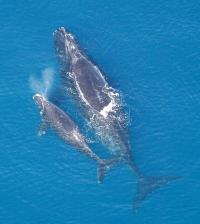 2017 was a disastrous year for the North Atlantic right whale and 2018 looks no better. In fact, it could be worse. Last year 17 North Atlantic right whales, died which is more than died in the past five years combined. Even worse, during this year’s breeding season, which typically runs from November through February, no newly-born calves have been sighted.
2017 was a disastrous year for the North Atlantic right whale and 2018 looks no better. In fact, it could be worse. Last year 17 North Atlantic right whales, died which is more than died in the past five years combined. Even worse, during this year’s breeding season, which typically runs from November through February, no newly-born calves have been sighted.
The Boston Globe quotes Barb Zoodsma, a biologist who oversees the right whale recovery program in the Southeast for the National Oceanic and Atmospheric Administration. “This is the worst-case scenario. This season appears to be a total bomb. You don’t have to be a math major to see that things are going in the wrong direction.”
Between 2010 and 2016, 85 percent of diagnosed whale deaths were the result of entanglement in commercial fishing nets and gear. Vessel-strikes are also a frequent cause of right whale deaths. NOAA researchers are calling the sharp upturn in whale deaths last year an “unusual mortality event.”
The Center for Biological Diversity, Defenders of Wildlife, and the Humane Society have filed a lawsuit alleging that President Trump’s Department of Commerce, of which NOAA is a branch, is in violation of the 1973 Endangered Species Act and the 1972 Marine Mammal Protection Act over their management of the North Atlantic lobster fishery, which “frequently entangles right whales,” according to the suit.
Of the only 450 surviving North Atlantic right whales, there are only about 100 breeding females. If the current trend continues the species could be extinct with 25 years.
Mother Jones reports: “The scariest part is that North Atlantic right whales aren’t the only whale species dying off in unprecedented numbers. NOAA recently announced that humpback whales and minke whales have also experienced “unusual mortality events” in the past year. To put that in context, between 1991 and 2018, the agency has declared a total of 65 marine mammal “unusual mortality events.” Of the three events declared since the start of 2017, all have been in response to whale deaths.”

This is tragic, tragic news — not one baby this year. None. At the beginning of 2017 experts were theorizing that there were about 500 North Atlantic Right Whales remaining and then we had 17 or 18 deaths, including some carcasses which washed up on the shores of this island. Forty years ago, when fishermen switched over from harpoons to long lines to catch swordfish (and other large fish) — I realized that it was totally unsustainable because the long lines caught everything including immature fish and even babies. Back then I decided to NEVER eat sword fish again and I never have. Now I will never eat lobster again. Please take the pledge because snow crab and lobster fishing gear are implicated in the deaths due to entanglement. There are much safer options than the current fishing gear. Vote with your voice, and vote with your money and stomach!
ummm, this might have a bearing as well:
The US Navy has permission
to use their deadly sonar in 75% of the world’s oceans and are doing so without filing the legally required Environmental Impact Statements.
In the US alone, they are now legally allowed to cause 31 million instances of harm and thousands of deaths to cetaceans over the next 5 years despite the outcry of thousands of citizens.
Lethal Sound (short version): Sonar Harms Whales
Watch this 1-minute preview narrated by Pierce Brosnan.
https://www.youtube.com/watch?v=57jshn7qpss
Click here for the full movie (about 5 minutes) …
http://whaleanddolphinwatch.org/
Maybe the parent whales decided to wait until Jan. or Feb. to mate?
PLASTIC!!
29 Whales Found
Dead – And We Did
It
http://awesomeocean.com/whales/29-whales-found-dead/
Many of the
whales found dead in
Canada this summer died
because of blunt force
trauma.
https://news.nationalgeographic.com/2018/02/north-atlantic-right-whales-calving-season-extinction-spd/
It is true that some of the Right Whale deaths last year (2017) were caused by blunt force trauma, but many of the 17 or 18 were whales which had been entangled. Some were so badly decomposed that the cause of death could not be determined. We don’t know how many died without being found or identified.
A friend reminded me that sea turtles are also likely to be entangled by fishing gear. It is important to remember that there are ways to modify gear (and not at great expense) to make it safer, allowing the fishermen to continue to fish and the marine creatures to safely traverse the oceans.